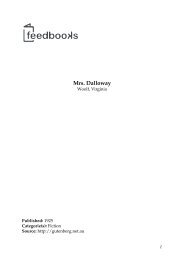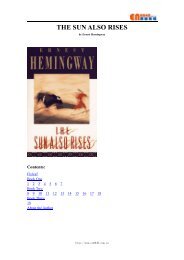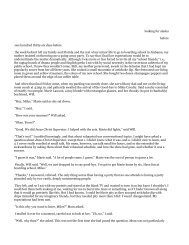Farewell Summer ~ Ray Bradbury - Marimarister
Farewell Summer ~ Ray Bradbury - Marimarister
Farewell Summer ~ Ray Bradbury - Marimarister
You also want an ePaper? Increase the reach of your titles
YUMPU automatically turns print PDFs into web optimized ePapers that Google loves.
Afterword: The Importance of Being Startled<br />
The way I write my novels can best be described as imagining that I‘m going into the<br />
kitchen to fry a couple of eggs and then find myself cooking up a banquet. Starting with very<br />
simple things, they then word-associate themselves with further things until I‘m up and running<br />
and eager to find out the next surprise, the next hour, the next day or the next week.<br />
<strong>Farewell</strong> <strong>Summer</strong> began roughly fifty-five years ago when I was very young and had no<br />
knowledge of novels and no hope of creating a novel that was sensible. I had to wait for years for<br />
material to accumulate and take me, unaware, so that as I sat at my typewriter quite suddenly<br />
there would be bursts of surprise, resulting in short stories or longer narratives that I then<br />
connected together.<br />
The main action of the novel takes place in a ravine that cut across my life. I lived on a<br />
short street in Waukegan, Illinois, and the ravine was immediately east of my home and ran on<br />
for several miles in two directions and then circled around to the north and to the south, and<br />
finally to the west. So, in effect, I lived on an island where I could, at any time, plunge into the<br />
ravine and have adventures.<br />
There I imagined myself in Africa or on the planet Mars. That being so, and my going<br />
through the ravine every day on my way to school, and skating and sledding there in winter, this<br />
ravine remained central to my life and so it was natural that it would become the center of this<br />
novel, with all of my friends on both sides of the ravine and the old people who were curious<br />
time-pieces in my life.<br />
I‘ve always been fascinated by elderly people. They came and went in my life and I<br />
followed them and questioned them and learned from them, and that is primarily true in this<br />
novel because it is a novel about children and old people who are peculiar Time Machines.<br />
Many of the greatest friendships in my lifetime have been with men or women who were<br />
in their eighties or nineties and I welcomed the chance to ask them questions and then to sit, very<br />
quietly, saying nothing and learning from their responses.<br />
In a way, <strong>Farewell</strong> <strong>Summer</strong> is a novel about learning by encountering old people and<br />
daring to ask them certain questions and then sitting back and listening to their answers. The<br />
questions posed by Doug, and the answers given by Mr. Quartermain, provide the organization<br />
of the action of the chapters and the final resolution of the book.<br />
The bottom line here is that I am not the one in control. I do not try to steer my<br />
characters; I let them live their lives and speak their truths as quickly as possible. I listen, and<br />
write them down.<br />
<strong>Farewell</strong> <strong>Summer</strong> is actually an extension of my book Dandelion Wine, which I<br />
completed fifty-five years ago. When I delivered it to my publishers they said, ―My God, this is<br />
much too long. Why don‘t we publish the first 90,000 words as a novel and keep the second part<br />
for some future year when you feel it is ready to be published.‖ At the time, I called the full,







